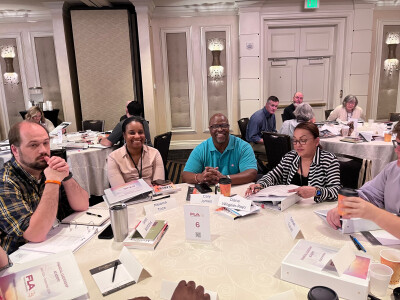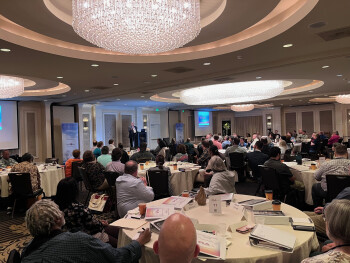'Make it rain': FLA helps pastors with stewardship, theology of money
 In the middle of the COVID-19 pandemic, the Mid-Atlantic United Methodist Foundation sent a short video each day for 30 days to its Financial Leadership Academy class with a task.
In the middle of the COVID-19 pandemic, the Mid-Atlantic United Methodist Foundation sent a short video each day for 30 days to its Financial Leadership Academy class with a task.
The first day’s task for the pastors in the class was to use their imagination: what would they spend $1 million on if they were blessed with a gift from a donor? The pastors had a lot of fun with the task and it allowed them to get creative, said Annabel Lusardi, assistant director of customer care for the foundation.
But, almost providentially, three of the pastors actually did receive gifts of $1 million from donors within a year of the class.
Now, Lusardi can’t promise this year’s pastors will get a gift of $1 million or even $10. However, she does believe that the Financial Leadership Academy will equip pastors to better navigate the world of stewardship, specifically when it comes to the finances of the church.
“One of the biggest takeaways that most pastors through the program have is that they all have a newfound confidence about talking about money,” Lusardi said.
The Mid-Atlantic United Methodist Foundation provides investment and stewardship education for the Baltimore-Washington, Eastern Pennsylvania and the Peninsula-Delaware Conferences of The United Methodist Church. The Financial Leadership Academy, which has been held for the past 10 years, is just one service the foundation provides to the three conferences.
Over the course of 18 months, pastors and lay leaders will take part in five in-person sessions. Each session is about two and a half days. Speakers will present on a wide swath of topics: starting from the beginning with the theology of money to how to cultivate legacy giving. Other topics include looking at how other non-profits raise money and how churches can find other streams of income.
One of the defining features of the academy, Lusardi pointed out, is the use of coaches within small groups to help guide students during classes and in-between sessions at their respective churches. That information is also shared with the pastors’ congregations.
 “That coach will work with them during the in-person sessions to guide their conversations and help them understand what they're learning and how they might apply what they've learned in their own settings,” Lusardi said. “We really think that this helps hold them accountable to setting goals and actually putting into practice what they learned at the academy.”
“That coach will work with them during the in-person sessions to guide their conversations and help them understand what they're learning and how they might apply what they've learned in their own settings,” Lusardi said. “We really think that this helps hold them accountable to setting goals and actually putting into practice what they learned at the academy.”
The most recent session of the academy started on April 15.
And Lusardi said the academy often comes across an issue that isn’t often talked about: pastors traditionally not being encouraged to talk about money, or even taught about financial leadership at seminary.
“Pastors are highly qualified to do pastoral care, preaching, teaching and congregational leadership,” Lusardi said. “But they have really not had training on what it means to be a financial leader.”
Now more than ever, pastors need training in financial stewardship, she added. The nature of The United Methodist Church is changing, and that change has only been accelerated by the COVID-19 pandemic.
Twenty-five percent of United Methodist churches have left the denomination from 2019 to 2023, according to the Lewis Center for Church Leadership at Wesley Theological Seminary. That’s the largest schism within Methodism since 1844, when many Methodists left over slavery.
But the nature of religion at large in the United States is also changing, especially as the pandemic era drifts in the rear view. According to the Pew Research Center, one in five Americans said they attend religious services in person less often than before the pandemic. By 2030, as few as a third of Americans will identify as Christian by 2070, another study from Pew found
“There are fewer people connected to churches, and yet we believe that there is still a mission that the church is vital for in the community,” Lusardi said. “We believe that it's worth investing in these pastors and lay leaders. Give them the tools that they need to really be able to fund ministry.”
And financial leadership has its foundations in Scripture. Counter to some perceptions, Lusardi said, Jesus talked about money — and he talked about it a lot
“What we teach is that it is actually good to talk about money,” she said. “Jesus talks about money more than any other topic — and he did so in a way that was encouraging people to recognize that they have enough. One of the biggest things we teach is the difference in a mindset between having a mindset of scarcity and abundance.”
“We believe that Jesus taught from a place of abundance, and that we are all in a place of abundance, and that when we live a life of abundance.”
Previous years’ students agree.
“What I learned is that nothing is impossible for God,” the Rev. Selena Johnson of Mt. Zion UMC said in the academy’s testimonial video. “People want to give to the mission and the ministry that God is doing in and through us.”
